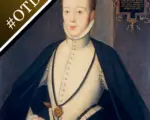
On This day in Tudor history, 7th December, Mary, Queen of Scots’ second husband, Henry Stuart, Lord Darnley, was born (1545), and rebel leader Robert Kett was hanged from the walls of Norwich Castle (1549)…
[Read More...]
On This day in Tudor history, 7th December, Mary, Queen of Scots’ second husband, Henry Stuart, Lord Darnley, was born (1545), and rebel leader Robert Kett was hanged from the walls of Norwich Castle (1549)…
[Read More...]
On this day in Tudor history, 27th August, the Battle of Dussindale ended Kett’s Rebellion, and the English and Imperial forces stormed St Quentin…
[Read More...]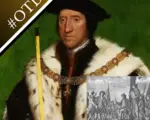
On this day in Tudor history, 25th August, the rebels of Kett’s Rebellion launched at an attack on the city of Norwich, and Thomas Howard, 3rd Duke of Norfolk, magnate, soldier and uncle of Queens Anne Boleyn and Catherine Howard, died at Kenninghall…
[Read More...]
On this day in Tudor history, Margaret Tudor set off for Scotland to marry James IV; Kett’s Rebellion began in East Anglia; and Henry VIII’s eldest daughter, Mary, declared herself queen at Kenninghall…
[Read More...]
On this day in Tudor history, 26th August 1549, in the reign of King Edward VI, John Dudley, Earl of Warwick, received 1,000 mercenaries as reinforcements to fight the rebels of Kett’s Rebellion.
Kett’s Rebellion had begun in East Anglia in early July 1549. The rebels were unhappy with the enclosure of common land.
They attacked and took Norwich on 22nd July 1549 and William Parr, Marquess of Northampton, was sent with crown forces to win back the city. However, he was defeated. The Earl of Warwick was then sent to the area with a large army, which was bolstered with the arrival of the mercenaries on this day in 1549. The next day, Warwick’s forces met the rebels at the Battle of Dussindale. There were heavy losses on both sides, but Warwick was victorious. The rebellion had been brought to an end.
[Read More...]
On this day in Tudor history, 31st July 1549, in the reign of King Edward VI, Edmund Sheffield, 1st Baron Sheffield, was killed in Norwich.
Twenty-eight-year-old was serving in the royal force led by William Par, Marquess of Northampton, during Kett’s Rebellion in East Anglia.
They were trying to take Norwich back from the rebels, but suffered a brutal attack in the streets for the city. Apparently, Sheffield stumbled into a ditch and then was killed by a blow from a butcher named Fulke.
[Read More...]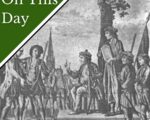
On this day in Tudor history, 8th July 1549, in the reign of King Edward VI, Kett’s Rebellion began.
Robert Kett, a Norfolk farmer, agreed to lead a group of protesters who were angry with the enclosure of common land. The protesters marched on Norwich, and by the time they reached the city walls, it is said that they numbered around 16,000.
[Read More...]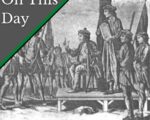
On this day in Tudor history, 7th December 1549, in the reign of King Edward VI, Robert Kett, the former leader of Kett’s Rebellion, was executed.
The rebel leader was hanged from the walls of Norwich Castle after being found guilty of treason. His brother William was hanged the same day, but from the steeple of Wymondham Church.
You can find out all about Robert Kett and his rebellion in this video:
[Read More...]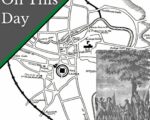
On this day in Tudor history, 25th August 1549, in the reign of King Edward VI, the rebels of Kett’s Rebellion launched an attack on the south side of Norwich and burned a number of buildings.
Kett’s Rebellion lasted from July 1549 until the 27th August 1549, when they were defeated by Crown forces at the Battle of Dussindale.
But what was it all about? What were the rebels’ grievances?
Find out more about this rebellion…
[Read More...]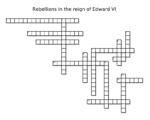
Edward VI’s reign was relatively short but but saw two major rebellions against his government, both in the summer of 1549.
How much do you know about Kett’s Rebellion and the Prayer Book Rebellion?
Find out with this fun crossword puzzle.
[Read More...]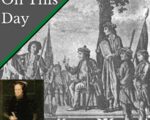
On this day in Tudor history, 8th July 1549, in the reign of King Edward VI, a rebellion began in East Anglia. It was Kett’s Rebellion.
Find out more about Kett’s Rebellion, why it began, what happened next and what happened to the rebels leaders, in this short video:
[Read More...]
On this day in Tudor history, 27th August 1557, St Quentin was stormed by English and Imperial forces. Admiral de Coligny and his French troops, numbering only a thousand, were overcome by around 60,000 soldiers, and St Quentin fell. Henry Dudley, the youngest son of the late John Dudley, Duke of Northumberland, was killed by a cannonball during the storming.
Find out about the siege and battle, and what happened next…
[Read More...]
On this day in history, 25th August 1554, Thomas Howard, 3rd Duke of Norfolk, magnate, soldier and uncle of Queens Anne Boleyn and Catherine Howard, died of natural causes at his home of Kenninghall in Norfolk. He was laid to rest in St Michael’s Church, Framlingham, Suffolk.
Find out more about this important Tudor man, and how he escaped the axe-man and died at a good age in his bed…
[Read More...]
On this day in Tudor history, 31st July 1549, Edmund Sheffield, 1st Baron Sheffield, was killed by a butcher during Kett’s Rebellion in East Anglia.
What happened?
Find out…
[Read More...]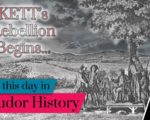
On this day in Tudor history, 8th July 1549, in the reign of King Edward VI, a rebellion began in East Anglia. It was Kett’s Rebellion.
Find out more about Kett’s Rebellion, why it began, what happened next and what happened to the rebels leaders, in this latest edition of #TudorHistoryShorts…
[Read More...]
On this day in Tudor history, 7th December 1549, rebel leader Robert Kett was hanged from the walls of Norwich Castle after being found guilty of treason. His brother William was hanged the same day, but from the steeple of Wymondham Church.
In 1549, Kett was seen as a rebel and traitor who endangered the city of Norwich, but today Norwich pays tribute to him as “a notable and courageous leader in the long struggle of the common people of England to escape from a servile life into the freedom of just conditions”. Find out all about Robert Kett and Kett’s Rebellion in today’s talk.
[Read More...]
On this day in Tudor history, 27th August 1549, the Battle of Dussindale took place near Norwich, in East Anglia. It ended Kett’s Rebellion once and for all.
I explain what happened on that day in 1549 and what happened to the rebels who survived the battle.
[Read More...]
On this day in Tudor history, 25th August 1549, Robert Kett and his rebels launched an attack on the south side of Norwich and burned a number of buildings.
Kett’s Rebellion lasted from July 1549 until the Battle of Dussindale on 27th August 1549, but what was it all about? What were the rebels’ grievances?
Find out more about this rebellion in the reign of King Edward VI in today’s talk.
[Read More...]
July 1549. The almost twelve-year-old Edward VI had been King of England for two-and-a-half years. Landlords had begun enclosing the common lands, which prevented peasants from being able to have a place for their animals to graze. Several landlords had taken to raising sheep, as the English wool trade was growing quite prosperous. This, in concert with a host of other problems such as inflation and unemployment, led to unrest for the lower classes.
After Edward Seymour, Lord Protector, had issued a proclamation on behalf of Edward VI that made enclosures illegal, several peasants tore down a fence that was raised in the town of Attleborough. On 6 July, the town of Wymondham was observing the illegal feast day for Thomas Beckett. Henry VIII had outlawed any such celebrations or commemorations of Thomas Becket back in 1538. After the festivities, some revellers got together and decided to dismantle some of the enclosures. This was the beginning of the Norfolk uprising and posed a significant threat to the Lord Protector’s government.
[Read More...]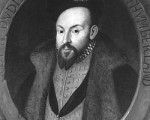
On 27th August 1549, the Battle of Dussindale took place, ending Kett’s Rebellion in Norfolk.
[Read More...]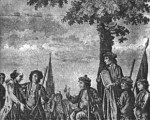
8th July 1549 was the beginning of Kett’s Rebellion. Robert Kett, a Norfolk farmer, agreed to lead a group of protesters who were angry with the enclosure of common land. The protesters marched on Norwich, and by the time they reached the city walls, it is said that they numbered around 16,000.
[Read More...]